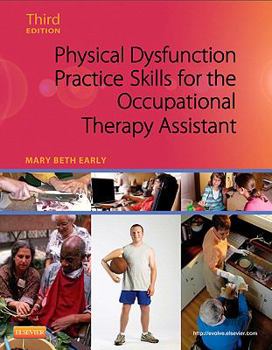Physical Dysfunction Practice Skills for the Occupational Therapy Assistant
Select Format
Select Condition 
Book Overview
Covering the scope, theory, and approaches to the practice of occupational therapy, Physical Dysfunction Practice Skills for the Occupational Therapy Assistant, 3rd Edition prepares you to care for adults who have physical disabilities. It takes a client-centered approach, following the latest OT Practice framework as it defines your role as an OTA in physical dysfunction practice. New to this edition is coverage of polytrauma, advances in prosthetics and assistive technologies, and assessment and interventions of traumatic brain injury problems related to cognitive and visual perception. Written by respected educator Mary Beth Early, Physical Dysfunction Practice Skills for the Occupational Therapy Assistant helps you develop skills in the assessment of client factors, intervention principles, and clinical reasoning.
Case studies offer snapshots of real-life situations and solutions, with many threaded throughout an entire chapter.A client-centered approach allows you to include the client when making decisions about planning and treatment, using the terminology set forth by the 2008 Occupational Therapy Practice Framework.
Evidence-based content includes clinical trials and outcome studies, especially those relating to intervention.
Key terms, chapter outlines, and chapter objectives introduce the essential information in each chapter.
Reading guide questions and summaries in each chapter make it easier to measure your comprehension of the material.
Information on prevention is incorporated throughout the book, especially in the Habits on Health and Wellness chapter.
Cultural diversity/sensitivity information helps you learn about the beliefs and customs of other cultures so you can provide appropriate care.
An Evolve companion website reinforces learning with resources such as review questions, forms for practice, crossword puzzles, and other learning activities. New content on the latest advances in OT assessment and intervention includes prosthetics and assistive technologies, and updated assessment and interventions of TBI (traumatic brain injury) problems related to cognitive and visual perception.





